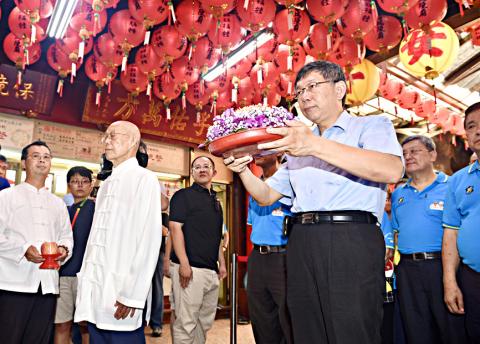The public wants to know President Tsai Ing-wen’s (蔡英文) definition of “Taiwanese values,” Taipei Mayor Ko Wen-je (柯文哲) said yesterday.
Ko on Friday said in a television interview that he is waiting for Tsai to turn in her “exam papers,” referring to her policy plans, to decide whether he will support her in next year’s presidential and legislative elections.
Tsai yesterday said that her “report card will be for the people to review, not for a certain politician or a political party.”

Photo: Lo Pei-der, Taipei Times
Later in the day, reporters approached Ko at a traditional pudu (普渡, “universal salvation”) ceremony in Taipei for comments on Tsai’s remark.
“Of course [her remark] is correct, but I believe every person in Taiwan really wants to know what President Tsai’s ‘Taiwanese values’ are,” he said.
“She used to ask other people, now it is her turn to answer other people’s questions,” Ko added, referring to a TV interview in January last year in which Tsai, then the chairperson of the Democratic Progressive Party (DPP), was asked whether the party would support Ko in the mayoral election in November, to which Tsai said that Ko should reaffirm his “Taiwanese values” so that DPP supporters can know that he is someone they can cooperate with.
When asked whether he has discussed the possibility of cooperation with Hon Hai Precision Industry Co founder Terry Gou (郭台銘) and Chinese Nationalist Party (KMT) Legislator Wang Jin-pyng (王金平) for next year’s election, Ko said it depends on whether a cooperation can create values that are demanded by the public.
Wang earlier yesterday reiterated that he would “seek to be president until the very end.”
Ko was asked whether Wang’s attitude might affect their cooperation.
“It depends on how Taiwanese mainstream opinion develops and what the market wants at the end,” he said. “I realized that for ideas to combine, everyone involved should be willing to compromise a little to achieve the bigger goal, because if everyone insists on their idea, then it would be difficult to achieve.”
However, Ko denied he meant for Wang to compromise, saying that his attitude toward working with Gou and Wang remains the same, which is: “Let nature take its course.”

Taiwanese can file complaints with the Tourism Administration to report travel agencies if their activities caused termination of a person’s citizenship, Mainland Affairs Council Minister Chiu Chui-cheng (邱垂正) said yesterday, after a podcaster highlighted a case in which a person’s citizenship was canceled for receiving a single-use Chinese passport to enter Russia. The council is aware of incidents in which people who signed up through Chinese travel agencies for tours of Russia were told they could obtain Russian visas and fast-track border clearance, Chiu told reporters on the sidelines of an event in Taipei. However, the travel agencies actually applied

Japanese footwear brand Onitsuka Tiger today issued a public apology and said it has suspended an employee amid allegations that the staff member discriminated against a Vietnamese customer at its Taipei 101 store. Posting on the social media platform Threads yesterday, a user said that an employee at the store said that “those shoes are very expensive” when her friend, who is a migrant worker from Vietnam, asked for assistance. The employee then ignored her until she asked again, to which she replied: "We don't have a size 37." The post had amassed nearly 26,000 likes and 916 comments as of this

New measures aimed at making Taiwan more attractive to foreign professionals came into effect this month, the National Development Council said yesterday. Among the changes, international students at Taiwanese universities would be able to work in Taiwan without a work permit in the two years after they graduate, explainer materials provided by the council said. In addition, foreign nationals who graduated from one of the world’s top 200 universities within the past five years can also apply for a two-year open work permit. Previously, those graduates would have needed to apply for a work permit using point-based criteria or have a Taiwanese company

The Shilin District Prosecutors’ Office yesterday indicted two Taiwanese and issued a wanted notice for Pete Liu (劉作虎), founder of Shenzhen-based smartphone manufacturer OnePlus Technology Co (萬普拉斯科技), for allegedly contravening the Act Governing Relations Between the People of the Taiwan Area and the Mainland Area (臺灣地區與大陸地區人民關係條例) by poaching 70 engineers in Taiwan. Liu allegedly traveled to Taiwan at the end of 2014 and met with a Taiwanese man surnamed Lin (林) to discuss establishing a mobile software research and development (R&D) team in Taiwan, prosecutors said. Without approval from the government, Lin, following Liu’s instructions, recruited more than 70 software